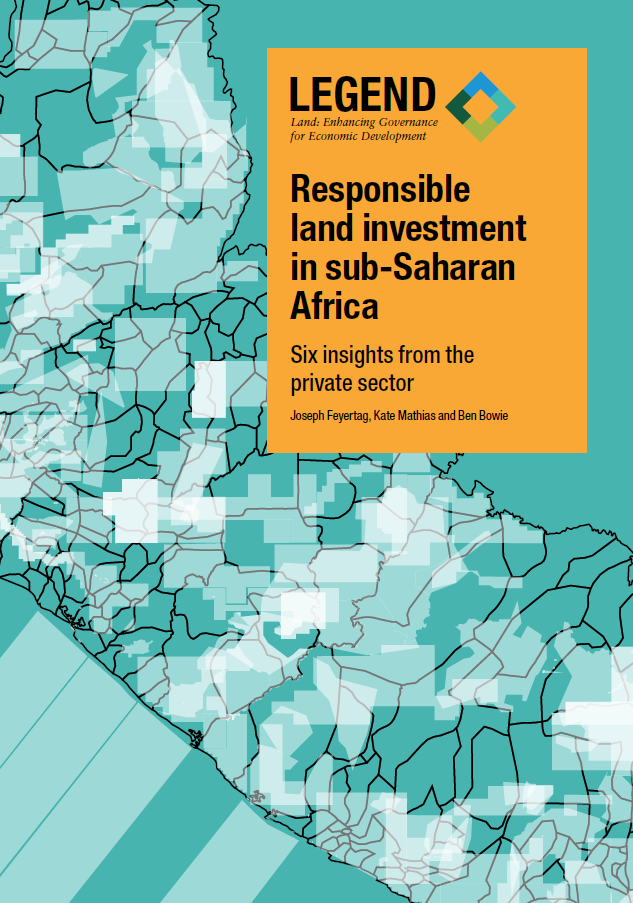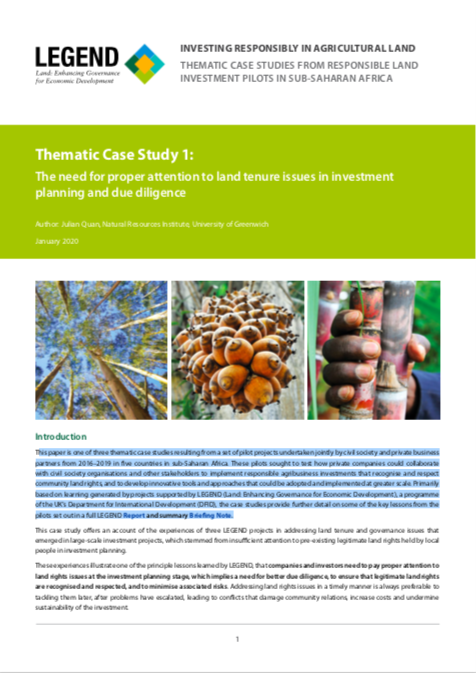
If carried out responsibly, more and better investment in agriculture could help improve rural livelihoods in low and middle-income countries. There are different visions of what constitutes responsible land investment (RLI) and how to successfully implement it, but it is clear that legal compliance alone is not enough: government and businesses need to recognise legitimate tenure rights of those affected by investment projects.
LEGEND outputs focus on drawing out the core elements of good practice to achieve fundamental aspects of RLI and address the information and power asymmetries that preclude any fair and informed negotiation.

Slide deck: Six private sector insights on responsible land investment in sub-Saharan Africa
Training Resources & Tools
March, 2020
Sub-Saharan Africa
This slide deck present's LEGEND's work on responsible land investment in sub-Saharan Africa.

Responsible Land Investment Lessons from five years of LEGEND CLST
Institutional & promotional materials
March, 2020
Global
There are different visions of what constitutes responsible land investment (RLI) and how to successfully implement it, but it is clear that legal compliance alone is not enough. This resource covers 7 Responsible Land Investment key lessons.

Responsible land investment in sub-Saharan Africa
Six insights from the private sector
Policy Papers & Briefs
March, 2020
Sub-Saharan Africa
This briefing consists of six insights drawn from the feedback of qualitative interviews with 37 companies aiming to invest responsibly in land, drawing on key principles from the CFS-RAI Principle 5 and the Voluntary Guidelines on the Responsible Governance of Tenure (VGGT).

Are development finance institutions equipped to address land rights issues?
A stocktake of practice in agriculture
Reports & Research
March, 2019
Africa, United States of America, Asia, Europe
Bilateral development finance institutions (DFIs) play an increasingly prominent role in the international aid architecture. Because of their position between development and commercial worlds, DFIs can be a key player in efforts to align private sector conduct with international norms and standards.

Are development finance institutions equipped to address land rights issues? [Executive Summary]
A stocktake of practice in agriculture
Reports & Research
March, 2019
Africa, United States of America, Asia, Europe
Bilateral development finance institutions (DFIs) play an increasingly prominent role in the international aid architecture. Because of their position between development and commercial worlds, DFIs can be a key player in efforts to align private sector conduct with international norms and standards.

Investing Responsibly in Agricultural Land
Lessons from responsible land investment pilots in sub-Saharan Africa
Reports & Research
December, 2019
Sub-Saharan Africa
This report details practical lessons on how to approach responsible land based investments in agriculture, derived from the experiences of LEGEND challenge fund projects and other pilots in Africa.

The need for proper attention to land tenure issues in investment planning and due diligence
Lessons from responsible land investment pilots in sub-Saharan Africa, Case Study 1
Reports & Research
January, 2020
Sub-Saharan Africa
This paper is one of three thematic case studies resulting from a set of pilot projects undertaken jointly by civil society and private business partners from 2016–2019 in five countries in sub-Saharan Africa. These pilots sought to test how private companies could collaborate with civil society organisations and other stakeholders to implement responsible agribusiness investments that recognise and respect community land rights, and to develop innovative tools and approaches that could be adopted and implemented at greater scale.

Lessons from responsible land investment pilots in sub-Saharan Africa, Case Study 2
Reports & Research
March, 2020
Sub-Saharan Africa, Mozambique, Tanzania, Sierra Leone
This paper is one of three thematic case studies resulting from a set of pilot projects undertaken jointly by civil society and private business partners from 2016–2019 in five countries in sub-Saharan Africa. These pilots sought to test how private companies could collaborate with civil society organisations and other stakeholders to implement responsible agribusiness investments that recognise and respect community land rights, and to develop innovative tools and approaches that could be adopted and implemented at greater scale.

Reducing concession size, adjusting business plans and developing more inclusive business models
Lessons from responsible land investment pilots in sub-Saharan Africa, Case Study 3
Reports & Research
March, 2020
Malawi, Mozambique, Western Africa, Ghana, Sierra Leone
This paper is one of three thematic case studies resulting from a set of pilot projects undertaken jointly by civil society and private business partners from 2016–2019 in five countries in sub-Saharan Africa. These pilots sought to test how private companies could collaborate with civil society organisations and other stakeholders to implement responsible agribusiness investments that recognise and respect community land rights, and to develop innovative tools and approaches that could be adopted and implemented at greater scale.
Addressing legacy land issues in agribusiness investments
Reports & Research
May, 2016
Global
This Analytical Paper explores legacy land issues as they affect agribusiness investments in low- and middle-income countries.
Legacy land issues: Addressing historical disputes in agribusiness investments
Policy Papers & Briefs
November, 2016
Global
This note provides guidance for businesses to identify and address legacy land issues in agricultural investments.

Legal empowerment in agribusiness investments: harnessing political economy analysis
Reports & Research
April, 2017
Global
This analytical paper explores how political economy analysis can help practitioners make sense of the issues, and distils insights from practical experience on how legal empowerment initiatives can rise to the challenge. It is aimed at legal empowerment practioners and analysts.

Briefing note: Legal Empowerment in Agribusiness Investments
Harnessing Political Economy Analysis
Policy Papers & Briefs
June, 2017
Global
This briefing note explores how political economy analysis can help practitioners make sense of the issues, and distils insights from practical experience on how legal empowerment initiatives can rise to the challenge.
Land governance and inclusive business in agriculture: advancing the debate
Reports & Research
October, 2018
Global
This report reviews the idea of inclusiveness in agricultural investments and analyses what ‘inclusiveness’ means to different value chain actors.
Evidence update 1: Land, population and agricultural investment in Africa
Reports & Research
October, 2016
Africa
Evidence updates, produced by LEGEND’s Core Land Support Team, provide a series of short briefs, summarising emerging bodies of evidence from different sources on key themes related to land governance or particular country issues. They offer technical advisers, policy-makers and researchers a way of keeping abreast of research to provide a source of quick evidence-based pointers on what to do and what to avoid in land-related policy and programming.

Focus on the Annual World Bank Conference on Land and Poverty 2016
Policy Papers & Briefs
May, 2016
Global
This LEGEND bulletin provides an overview of the main themes discussed and key messages identified by the LEGEND Core Land Support Team (CLST) during the 17th Annual World Bank Conference on Land and Poverty.

Why land governance?
Policy Papers & Briefs
June, 2015
Global
DFID is delighted to launch the first Land Policy Bulletin, which introduces a new land and responsible investment programme - Land: Enhancing Governance for Economic Development (LEGEND).
LEGEND Land Policy Bulletin 14
Securing land rights at scale: eight lessons and guiding principles on land tenure regularisation
Policy Papers & Briefs
June, 2019
Africa, Eastern Africa, Ethiopia, Mozambique, Rwanda, Tanzania
This bulletin focuses on land tenure regularisation (LTR), with articles from practitioners to accompany the new LEGEND report Securing land rights at scale: eight lessons and guiding principles on land tenure regularisation.

LEGEND Land Policy Bulletin 13
Responsible investments: are new initiatives hinting towards a shift in practice?
Policy Papers & Briefs
April, 2019
Eastern Africa, Tanzania, Western Africa, Global
This bulletin highlights initiatives to support socially responsible investment.
LEGEND Land Policy Bulletin 12
Inclusive business and agriculture: what are we learning from the field?
Policy Papers & Briefs
January, 2019
Global
This bulletin distils lessons from a sugarcane cooperative in Malawi and a forestry investment scheme in Sierra Leone, drawing on the five pillars of inclusive business as identified in the 2018 LEGEND state of the debate report.
LEGEND Land Policy Bulletin 11
DFID’s work on land: what future priorities?
Policy Papers & Briefs
September, 2018
Global
This bulletin highlights the breadth of DFID's current portfolio on land and prompts important questions about DFID’s work on land governance in the years to come.
LEGEND Land Policy Bulletin 10
Policy Papers & Briefs
May, 2018
Global
This LEGEND bulletin explores early experiences and emerging lessons from four of these projects, and includes testimony from community members attesting to their positive results.
The VGGT five years on – are they changing lives?
Policy Papers & Briefs
December, 2017
Global
This LEGEND bulletin considers the key components for monitoring and evaluating the Voluntary Guidelines on Responsible Governance of Tenure of Land, Fisheries and Forests in the Context of National Food Security (VGGT).
Agribusiness and land rights: turning good intentions into tangible change
Policy Papers & Briefs
August, 2017
Global
This LEGEND bulletin explores the relationship between agribusiness and land rights. It features articles on the power of local engagement for financial investment, using technology for mapping rights, and catalysing private sector respect for community land rights.

Can technology revolutionise efforts to secure land rights?
Policy Papers & Briefs
March, 2017
Global
This LEGEND bulletin considers the impact that new technology can have on documenting land rights and democratising access to land data around the world.

Harnessing the law for fairer agricultural investments
Policy Papers & Briefs
January, 2017
Global
This LEGEND bulletin takes stock of some of the recent experience in legal empowerment. The result is a kaleidoscope of approaches operating at different levels, but pursuing broadly converging agendas.


